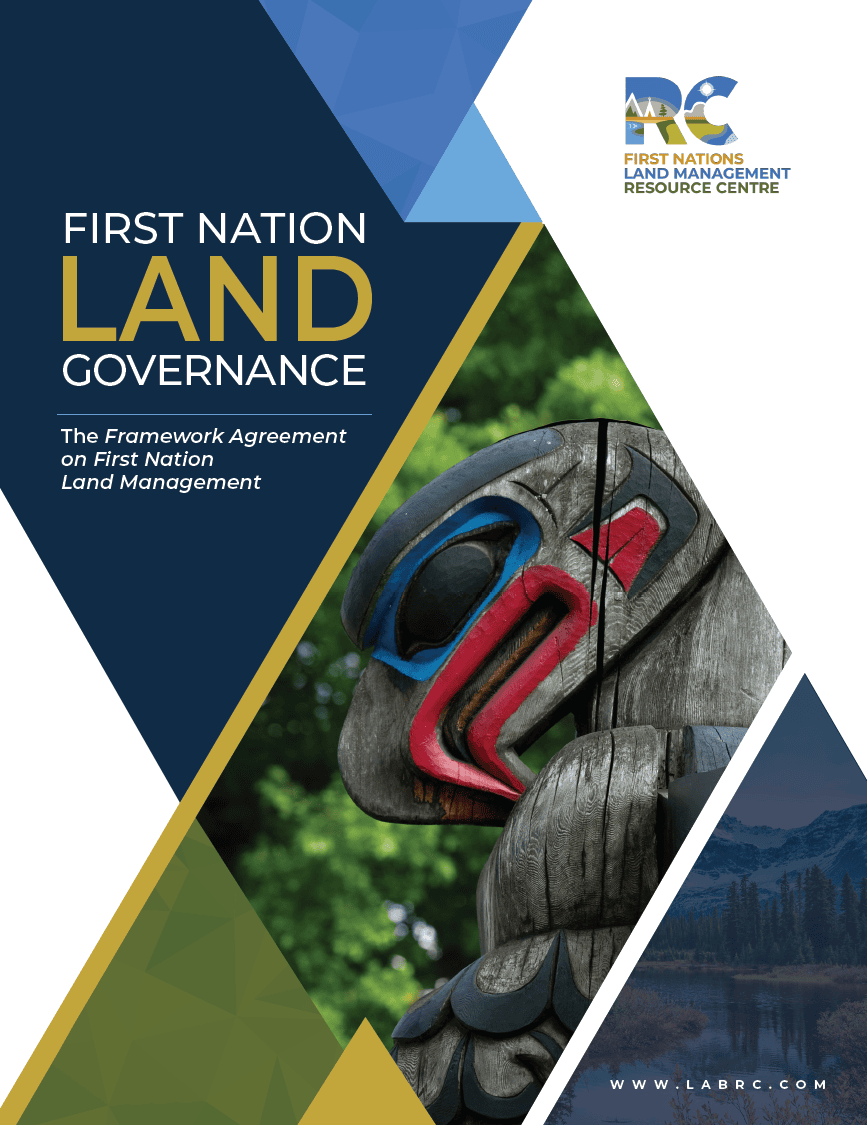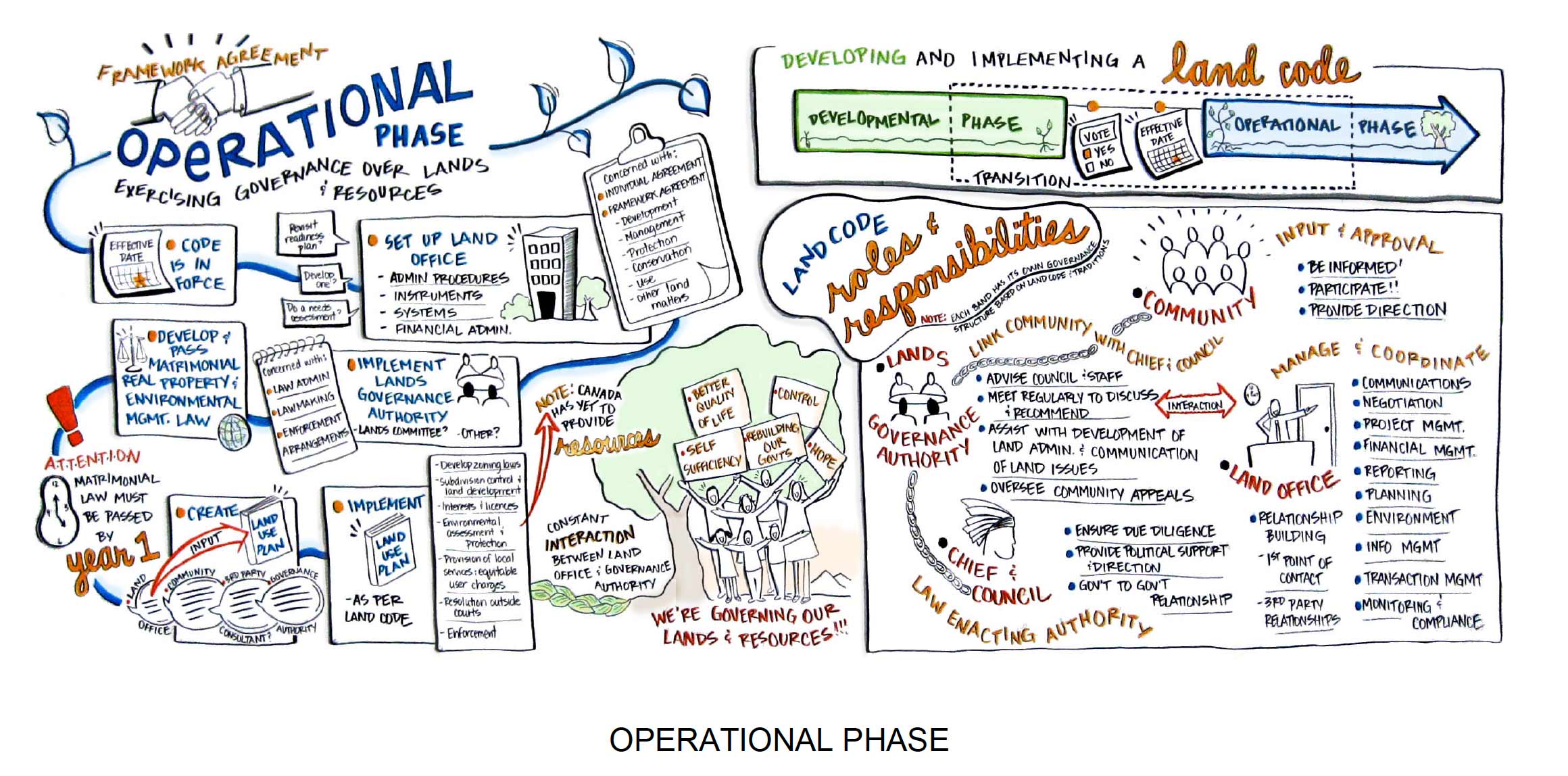
Click to download brochure:
- BC Region
- Prairies Region
- Eastern Region

I am an Operational First Nation
Your community has ratified the land code and the Individual Agreement, control over First Nation Reserve lands, Natural Resources and Environment are no longer be subject to the Indian Act, but recognized to be under the governance authority of the First Nation.
The Framework Agreement provides First Nations with all the legal status and powers needed to govern and manage their lands and resources. While First Nations will not be able to sell their land, they will be able to lease or develop their lands and resources, subject to any limits imposed by their own community Land Code.
PROTECTION OF FIRST NATION LAND
The preserving of the quantity and quality of existing First Nations lands is a fundamental principle of the Framework Agreement. Some aspects of this principle are summarized below:
Law-Making Powers: A First Nation governing its lands under a Land Code will have the power to make laws in respect of the development, conservation, protection, management, use and possession of First Nation land. The Land Code does not authorize laws relating to the taxation of real or personal property. Such laws must be made separately pursuant to section 83 of the Indian Act or the First Nations Fiscal Management Act. The First Nation’s Council can also continue to enact by-laws under section 81 of the Indian Act.
Land Management: The Framework Agreement provides the First Nation with the powers of an owner in relation to its First Nation Land, except for control over title or the power to sell it. The Framework Agreement also protects the status of lands under Section 91(24) of the Constitution Act, 1867 and ensures that any land exchanges by First Nations must include replacement reserve land to protect the size of the reserve land base. The First Nation’s Council can manage land and resources, as well as revenues from the land and resources, in accordance with its Land Code.
Third Party Interests: Interests in First Nation land held by third parties, or by Canada, will continue in effect according to their terms and conditions under a Land Code. No new interests or licences may be acquired or granted except in accordance with the Land Code.
First Nation Expropriation: The First Nation will have the option to acquire lands for community purposes upon payment of fair compensation to those whose interests are affected.
Accountability: A Land Code will make provision for a First Nation to be accountable for the governance of their lands, resources and revenues by reporting to its First Nation members.
Registration of Interests: All documents pertaining to land interests of a reserve will be recorded in the First Nation Land Registry System (FNLRS).
The FNLRS is: Electronic, Provides for Instant Registration, Priority-based, Paperless, Backed by Regulation (Unlike the Indian Act registry system)
The FNLRS system and regulations are landmark achievements. The regulations provide for greater land certainty, mortgageability, title insurance and drastically reduced or eliminated land transaction costs.
Taxation and Seizure under Legal Process: The current exemption of reserve lands and personal property situated on reserve lands, as well as limitations on seizure of lands under the Indian Act will continue to apply under the Framework Agreement.
Environmental Protection: A First Nation with a land code in effect will be required to develop an environmental protection regime. A First Nation will have the power to make environmental assessment and protection laws and will harmonize these laws with federal and respective provincial environmental laws.
Voluntary Exchange of Lands: A First Nation may decide that it is advantageous to exchange some of its First Nation lands for other lands. Provision can be made in its Land Code for a procedure to negotiate and approve such exchanges. An exchange of land cannot occur without the consent of the First Nation community.
No Provincial Expropriation: Under the Framework Agreement, there can be no expropriation of First Nation land by a provincial or municipal government or agency.
Restricted Federal Expropriation: Canada’s power to expropriate First Nation land is greatly restricted. That power can only be exercised with Cabinet approval and only when the expropriation is justified and necessary for a federal public purpose that serves the national interest. Compensation must include provision for equivalent lands so that the land base of the First Nation is not diminished.
Enforcement: The First Nation will have full power to enforce its land and environmental laws and may enter into further agreements with other jurisdictions to assist in such enforcement. A First Nation may appoint its own Justice of the Peace or special prosecutor to try offences created under a Land Code or a First Nation law. First Nation laws may make provision for search and seizure, fines, imprisonment, restitution, community service or alternate means for achieving compliance with its laws.
Resources
The Resource Centre is established under the Framework Agreement, to provide support for the implementation of community land codes.
We have developed online resources to assist you with these needs and upon request can provide your First Nation with one-on-one operational support and assist you with obtaining the necessary expertise to support your land management needs.
Governance Tools
The RC is committed to assist operational communities in identifying their priorities, needs, and work planning for the successful implementation of their Land Code.
